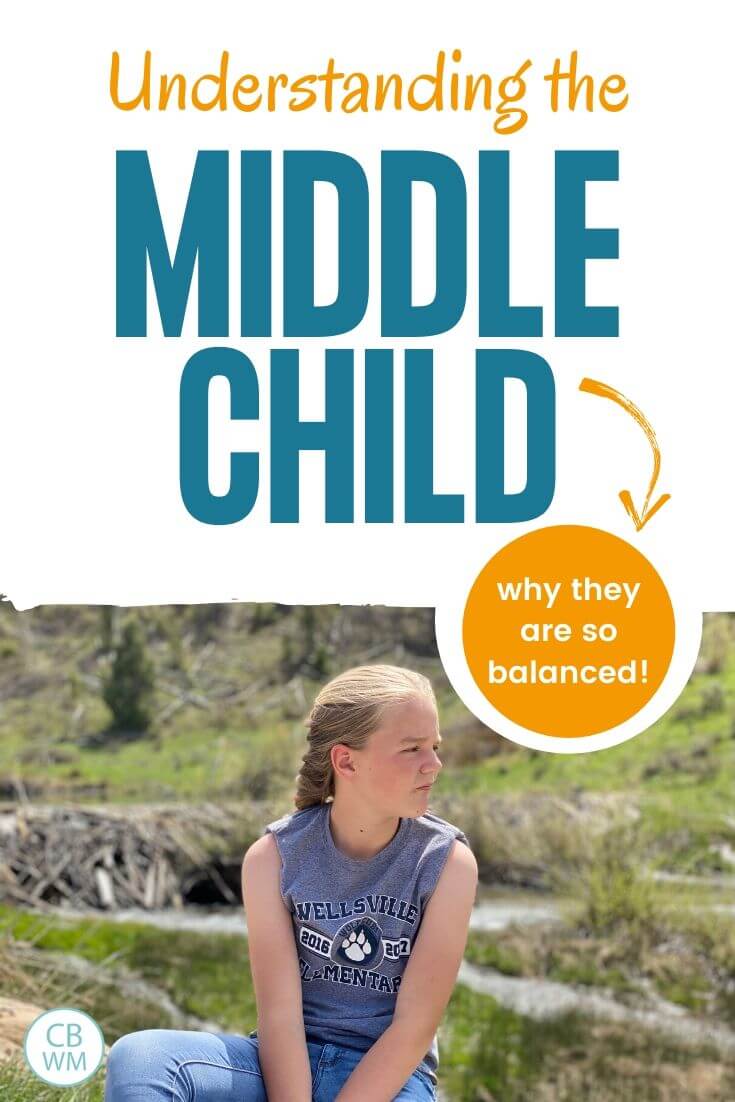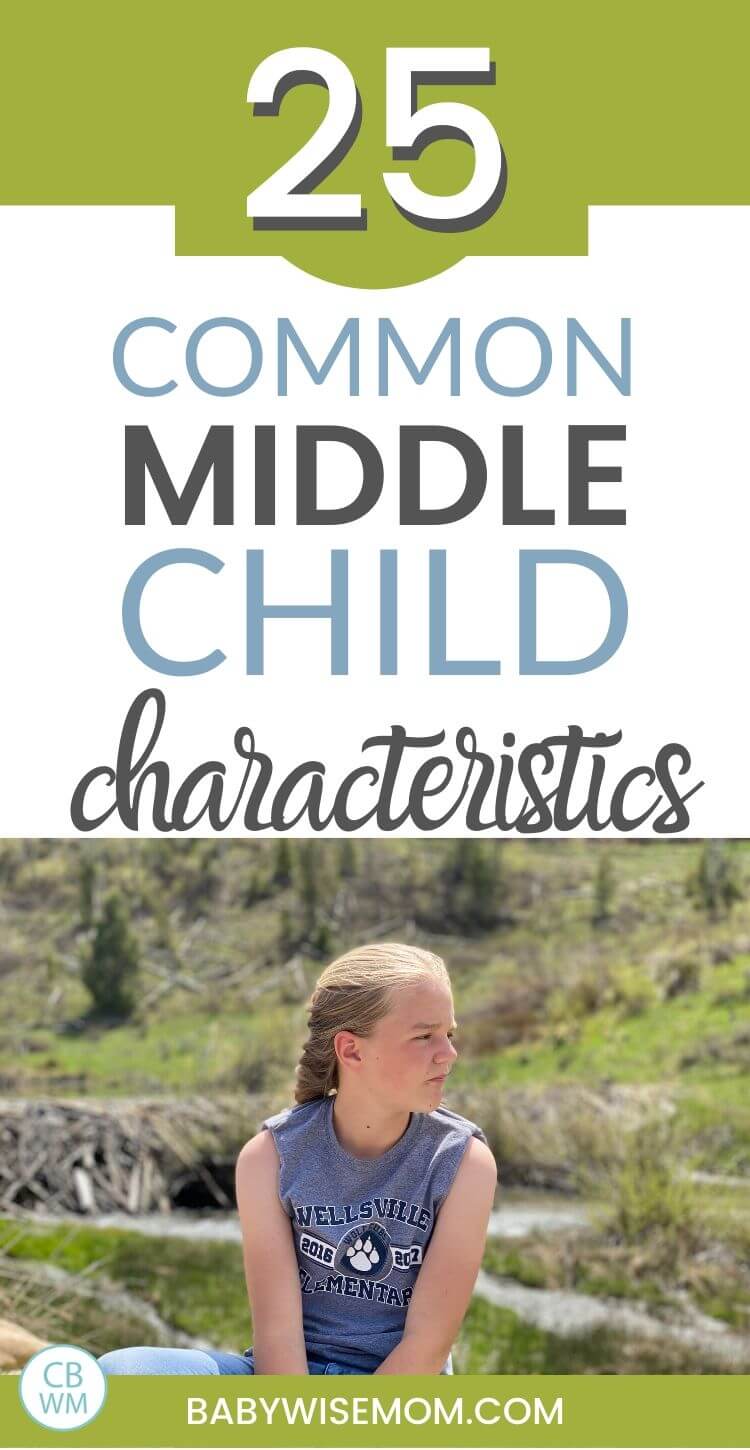A middle child can be somewhat of an enigma. Learn common characteristics of middle children and why they are so amazing!

There are lots of stereotypes out there on the middle child. Jan Brady ring a bell? “Marsha, Marsha, Marsha!”
In The Birth Order Book
“It is quite normal for middle children to feel left out, ignored, and even insulted”.
(page 149)
It seems that many parents feel really bad for the middle child–so much so for some that they consider “middle child syndrome” as a factor when deciding if they should have another child or not.
And some decide not because they don’t want to turn their current baby of the family into a middle child.
Post Contents
Trying to Understand Middle Children
Middle children are mysterious.
“…we psychologists don’t know that much about middle children”.
(page 150)
This is because middle children are highly influenced by the sibling just older, and often feel some pressure from siblings below.
A middle child is too young to have the rights of the oldest but too old to get away with the things a youngest child does. This can be frustrating all around!
For a middle child, his personality “…is determined by his perception of his older sibling” (page 152).
The middle child is also a paradox. Common characteristics found in middle children can be complete opposites. They are not as easy to predict as an oldest child or youngest child.
Understanding Birth Order Exceptions
Perhaps part of the difficulty lies in the birth order exceptions. Let’s look at my children, for example. This is our order of kids, as well as gender because that matters in birth order:
- Brayden (male)
- Kaitlyn (female)
- McKenna (female)
- Brinley (female)
We have Brayden, the oldest. We have Brinley, the youngest.
We have Kaitlyn, who is in some ways a middle child. But she is also a functional firstborn in that she is the oldest child in the family of her gender. So not only will she have middle child characteristics, but she will have oldest child characteristics as well.
Then we have McKenna, our true middle child. She is neither the oldest nor the youngest of her gender in our family.
Let’s travel hypothetically and say our fourth child had been a boy. If that fourth child were a boy, McKenna would have been a different middle child than she is. She would have stood a great chance at picking up some youngest child characteristics due to being the youngest girl and littlest princess.
So middle children are hard to peg in general because there are so many other variables that impact the middle child and how they tend to get treated. Parentes treat oldest like the oldest and youngest like the youngest, but middle children have many other variables that impact how they are treated.

Middle Children Are Pretty Amazing
So they might feel left out as children. They are hard to figure out and are a paradox. We should all feel bad for them, right?
Not really.
“All the research shows that middle borns do not have as many hang-ups or problems as first borns and only children”
(page 163)
Later in the book, Leman says the world needs more middle borns. Because of the nature of their place in the family, middle borns are good mediators. They learn to negotiate and compromise.
Leman states that he sees fewer middle borns in his office seeking psychiatric help than any other birth order. Part of that, he claims, is because
“…middle children tend to be mentally tough and independent”.
(page 161)
When I think of my children, I can understand how this would happen. When Kaitlyn was our only “middle child”, Kaitlyn had Brayden who was adept at getting attention.
She also had McKenna who needed constant care.
So what did she do?
She learned to do it herself. She had literally met many milestones the same time as Brayden–not same age, same day. She just figured she will do it herself. No sense in waiting around for help.
Our true middle born child, McKenna, is super independent and super accommodating. She asks us for the least. She is always willing to bring peace to a situation.
More good news for middle children. They tend to be “…the most monogamous of all birth orders” (page 161).
They are very loyal, and again, used to compromise. The middle child is not in need of constant attention and praise like other birth orders.
Kathy Nessel, a middle child and psychologist, says middle children have lower expectations and are more accepting in a relationship. She says they are used to things being unfair in life.
While that sounds sad, it is such a gift! Life indeed is unfair. Being able to accept that and move on with your day is such an amazing life skill.
Leman states a good word for middle children is balanced.
Middle Child Characteristics
With all of that said, let’s look at some of the common characteristics of the middle child:
- Loner, quiet, and shy, OR might be sociable, friendly, and outgoing
- Impatient and easily frustrated OR takes life in stride and laid-back
- Very competitive OR easygoing
- Rebel OR peacemaker and mediator
- Aggressive OR avoids conflict
- Hang out with peer group
- Leaves home as fast as possible
- A free spirit
- Great team players
- Often moves far from family as an adult
- Good at negotiation and compromise
- More of a closed book than an open one; secretive
- Do not confide in many people
- Mentally tough and independent
- Monogamous
- Loyal
- Rebellious as far as convention is concerned
- Balanced
- Typically not spoiled–but you could have rebelled because you felt left out
- Reasonable expectations and realistic–but you could be suspicious, cynical, and bitter
- Social, you make friends and keep them–but this can also put you in a position of bending over backward to not offend friends
- Independent thinker, you are willing to take risks–but you can also appear to be bullheaded and stubborn
- Compromising and know how to get along with others–but others might take advantage of you
- Diplomatic–but you might hide your own feelings to avoid confrontations
- Secretive and able to be trusted with secrets–but you might avoid seeking help because it is embarrassing
You can see that they kind of have this “either/or” with different characteristics.

Conclusion
So there you have it–the middle child. It isn’t such a bad place to be after all. I am constantly impressed with my middle child. As an oldest child, I admire her ability to go with the flow. I love that she doesn’t need to be right–even if she knows she is right, she can let it go.
Don’t feel sorry for your middle child and don’t avoid having more than two kids for fear of having a middle child. Make an effort to spend special time with each child, and get to know each child, but don’t feel sorry for your sweet middle child. Feel grateful the world has middle children.
Like Leman said, the world could use more of them.
RELATED BLOG POSTS
- Parenting the Middle Child
- Parenting All Birth Orders
- First Born Child and Birth Order
- Birth Order: The Youngest Child
- Birth Order: Characteristics of an Only Child
- The Birth Order Book: Why You Are the Way You Are
 The Birth Order Book: Why Y...Shop on Amazon
The Birth Order Book: Why Y...Shop on Amazon
This post originally appeared on this blog June 2010
